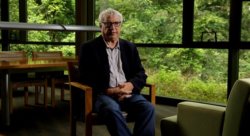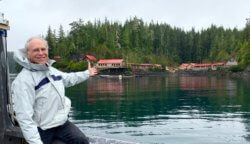In 2013 I watched the movie Blackfish, and it had a profound impact on me. It brought back my childhood memories of going to SeaWorld and having feelings of sadness watching the orcas and dolphins in shows because they weren’t free in the ocean. I remember being told by adults that these animals were happy because they were cared for and fed and were lucky to be there.
Blackfish hit a nerve, and I wanted to learn more about orcas in captivity, so I read articles and books and attended events and presentations that focused on captive and wild orcas. I learned about Corky and realized her story was a story that needed to be told. I didn’t set out to make a film—my original idea was to write a children’s book about Corky—but that idea morphed into wanting to make a video I’d post online. I started interviewing people, first with my iPhone and then with some camera operators who had a passion for orcas and offered their expertise. I never thought about making a feature-length documentary until George, one of my camera operators, said to me after we filmed an amazing interview that I had to make an actual film. He guided me and offered advice and services to get the project off the ground. There were many highs and lows during this six-year process, but Corky’s strength and endurance, along with the dozens of people who were connected with this film, always pulled me forward.

To give an overview of the film, Corky is an orca who has lived at two marine parks, Marineland of the Pacific and SeaWorld San Diego. She has been in captivity for 52 years and is the world’s longest-held captive orca. Corky’s family, the Northern Resident Killer Whales, are thriving and well known, and they have distinct dialects and a unique culture. The film weaves in how public sentiment about keeping orcas in captivity has changed and how public pressure led to SeaWorld no longer breeding orcas. The film also provides insight into the recent efforts of seaside sanctuaries, some that are now in operation and others that are currently being planned, giving hope for Corky and other cetaceans to be returned to their natural ocean habitat.
I didn’t think about animal rights before I started making this film; however, the more I considered the lives of animals and the more I attended protests against animals in captivity, I knew I wanted to change some aspects of my life, and one was to make the decision to go vegan.
During my research, I attended an event, the PAWS 2014 International Captive Wildlife Conference. I saw a riveting presentation, Toward Legal Personhood for Nonhuman Animals: The Nonhuman Rights Project, given by Steven Wise, and knew the NhRP was an organization I wanted to support. I became inspired by Steve’s passion, commitment, and tenacity. Fortunately, in 2016, a film featuring Steve called Unlocking the Cage was in the Seattle International Film Festival. I attended the screening and Q&A, and that’s when I knew I wanted to interview Steve for the CORKY film which was then in production.

I hope that people who watch the film will come to know Corky as an individual—an individual whose life with her family abruptly ended when she was captured at a young age in 1969. Her unique story can help bring awareness to sanctuaries and their potential to give animals a better, more just life.

This quote from Steve in the ending section of the film resonates with me, and I believe it will give the audience something to ponder when considering cetaceans’ right to liberty:
“Their cognitive abilities are not only extraordinary and show that they are autonomous, but they’re autonomous and cognitively advanced in the same way we are, so we can understand [their need for freedom].”
Thank you to the Nonhuman Rights Project for your work for animal rights.